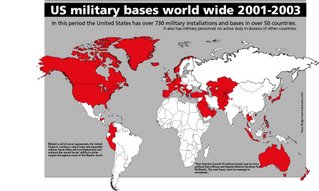One might expect any serious discussion of American imperialism to discuss the global network of US military bases, or the longstanding US tradition of aggression and intervention against sovereign non-belligerent states. You might expect to hear extended interviews with Chalmers Johnson, Noam Chomsky or Joseph Gerson. Instead the bulk of Raz' report is given over to unabashed apologists for American imperialism (Newt Gingrich, Niall Ferguson of the Hoover Institute, Francis Fukuyama of RAND and the US State Department, and the vitriolic Victor Davis Hanson of the National Review).
From these intellectuals we learn the following:
- Gingrich: The US has "no interest in conquering territories. We have every interest in getting people to believe in their own freedom, getting people to govern themselves."
- Ferguson: "A world without the US after 1945 would have been a worse world."
- Hanson: "We appeal to particular appetites: freedom, leisure, affluence, informality especially." and "The freewheeling American approach to money, to education, to popular culture, means that the power of the mullah, the patriarch, hierarchy in general, is always undermined by radical American egalitarianism."
Again it is a real shame that NPR takes on what could be a very rich an interesting topic, and then uses it to distort and misinform listeners.



4 comments:
Once again, I wonder why NPR's political pieces are so bad, so deviously warped and so dumbed down.
These kinds of reports remind me of middle school papers where the student seeks to please the teacher for the grade, is afraid of incautious errors and won't take a stand outside of conventionally accepted positions (and it was scribbled out the night before...). It's a cringing, careerist slacker mentality.
Another thing that bugs me, as an aside, is that NPR reporters will do these 20 minute interviews, only to cherry pick a minute or two for their on-air piece, banishing the rest to the web for download instead. I would rather listen to a 20 minute, in-depth interview than a series of 5 or 6 typically NPR-pablum pieces with musical bumpers that only tell me what I've already heard, over and over, on the conventional corporate media sites.
I had the good sense to walk outside and water my plants when I heard Raz's voice telling me yet another piece of thoughtless crap guarenteed to raise my blood pressure was about to air.
Did y'all catch lovely Mara cutting off Steve Inskeep when he called Ted Haggard a national evangelical leader, saying "I wouldn't call him a national leader," rather that he was a "regional" leader in Colorado?
I noticed that, too. Mara's just an embarrassment to NPR, which is saying alot.
NPR=Pravda
Post a Comment